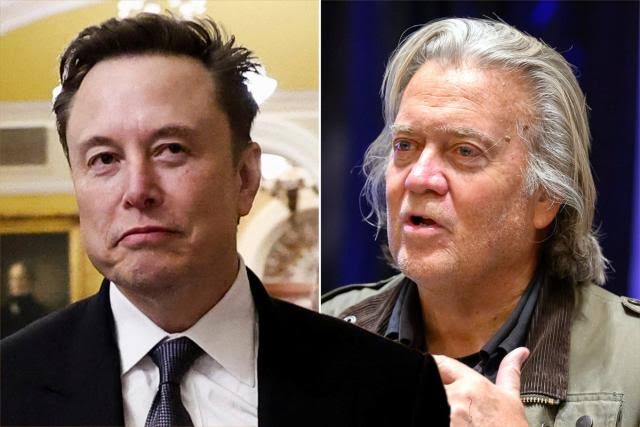Former White House adviser Steve Bannon has stirred controversy by calling on President Donald Trump to investigate Elon Musk’s immigration status and deport the South African tech billionaire. The clash between Trump and Musk unfolded on Thursday, June 5, sparking Bannon’s strong stance on the matter. In an interview with The New York Times, Bannon, a prominent figure in the MAGA movement, expressed his belief that Musk is an illegal alien who should be expelled from the country without delay.
“They should initiate a formal investigation of his immigration status because I am of the strong belief that he is an illegal alien, and he should be deported from the country immediately,”
This unexpected plea from Bannon has sent shockwaves through the tech and business communities, raising questions about the implications of such a drastic measure. With SpaceX being a pivotal player in the space industry, the potential fallout from this proposed action could have far-reaching consequences.
Elon Musk, known for his groundbreaking work in electric vehicles, renewable energy, and space exploration, has been a polarizing figure in both the corporate world and popular culture. His ventures, including Tesla and SpaceX, have pushed the boundaries of innovation and garnered worldwide attention. However, his outspoken nature and occasional clashes with authorities have also made him a lightning rod for criticism and debate.
As the news of Bannon’s call to deport Musk reverberates across social media and news outlets, it underscores the complex intersection of politics, technology, and immigration.
The relationship between Musk and Trump has been tumultuous, marked by moments of collaboration and conflict. While Musk has served on advisory councils for the Trump administration, their differing views on climate change and other issues have led to public disagreements. The recent dispute between the two influential figures has further fueled speculation about the future of their interactions.
Despite the sensational nature of Bannon’s proposal, legal experts caution that the process of deporting a high-profile figure like Elon Musk would be fraught with challenges and legal complexities.
The potential ramifications of such a move extend beyond Musk himself, affecting the employees, investors, and partners associated with his companies. SpaceX, in particular, stands out as a key player in the space industry, with ongoing projects and partnerships that could be disrupted by any upheaval in its leadership.
Furthermore, the broader implications for the tech sector and innovation ecosystem raise concerns about the impact of political interventions on entrepreneurship and technological progress.
Looking ahead, the evolving dynamics between government officials and industry leaders are likely to shape the landscape of innovation and regulation. The intersection of politics and technology is becoming increasingly complex, with debates around immigration, national security, and economic interests intersecting with the rapid pace of technological advancement.
As stakeholders across various sectors weigh the implications of Bannon’s controversial proposal, the outcome of this unfolding saga could have lasting effects on the tech industry and beyond.
In conclusion, the clash between Steve Bannon’s call to deport Elon Musk and the ensuing repercussions encapsulates the intricate relationship between power, politics, and innovation in today’s interconnected world. The outcome of this high-profile confrontation will not only impact the individuals involved but also reverberate throughout the realms of technology, business, and beyond.









Leave feedback about this